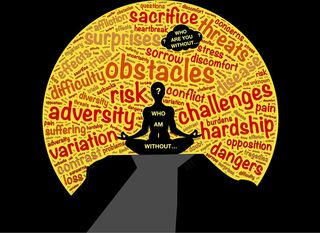George S. Everly, Jr. PhD, ABPP, FACLP
Most people try to avoid adversity, not understanding that it promotes growth.
KEY POINTS
- One of the tried-and-true lessons of history is that adversity can fuel happiness and success.
- As a muscle grows stronger with resistance, so can your resilience.
- Perhaps rather than trying to avoid all adversity, we should embrace it and let it propel us to greater heights.

Source: JohnHain/Pixabay
Simply said, stress can be the father of growth, while a crisis can be the mother of innovation. The notion that great good can emerge from great adversity is as old as the legend of the great Phoenix, who not only arises but soars to new heights from its own ashes.
In 1598, William Shakespeare penned the play As You Like It. One of the most famous lines from that play is spoken in Act 2 Scene 1 by the deposed Duke Senior, “Sweet are the uses of adversity which, like the toad, ugly and venomous, wears yet a precious jewel in his head” (II.1.12-17). Even 500 years ago, the potential value of adversity was recognized, not by a great healer, but by a great playwright.
Can this really be the case?
Fast-forward to the great silent film-era star Mary Pickford. She was called the most popular actress in the world in the 1910s and 1920s. Failing to successfully continue acting with the advent of the “talkies” (movies with recorded sound), she co-founded the film company United Artists. Shifting her talents to producing and directing, she became the most powerful woman in the entertainment industry. She once noted, “You may have a fresh start any moment you choose, for this thing that we call ‘failure’ is not the falling down, but the staying down.”
Rather than fear and try to avoid crisis, a fool’s errand at best, perhaps we should accept the inevitability of crisis and prepare for, if not embrace, it. As a muscle grows stronger with stress, so can teams, organizations, communities, and even individuals.
Indeed, positive things can emerge from the crisis.
According to the remarkable book The Coddling of the American Mind (2018) by Greg Lukianoff and Jonathan Haidt, overprotection is the greatest failure we can commit. It engenders a victim mentality and a false belief in fragility. And as Spencer wrote, the ultimate result of shielding men from their effects of folly is to fill the world with fools.
Crisis reveals true strength. It also reveals true opportunities for those prepared to take advantage. With the dawning of the 20th century, the written form of the Chinese language largely changed to the logosyllabic Mandarin form. There is not an alphabet, per se, but rather characters that serve as symbols used to capture the intention of the writer. The English word “crisis” may be captured by the Chinese characters 危 机. Loosely translated, these two characters are the symbols for “danger” and “possibility” (opportunity), respectively.
Dr. John Krumboltz’s happenstance theory states that career and life development is best fostered by preparing for opportunities that you may not know even exist in the current moment. Myriad unpredictable factors are at work potentially shaping the future. This includes crisis. One of President Obama’s key advisors, Rahm Emanuel, once noted, “You never let a serious crisis go to waste. And what I mean by that it’s an opportunity to do things you think you could not do before.” Further, it may be said that a rising tide lifts all boats, but a storm can actually benefit the few that are prepared for adversity. Louis Pasteur observed, “Chance favors the prepared…”article continues after advertisement

Source: sasint/Pixabay
RELATED: How to have a Growth Mindset
In his last book, Behold the Man (1908), the German philosopher Friedrich Nietzsche wrote that a person who has “turned out well” could be recognized by the ability to take advantage and prosper from adversity. Nietzsche wrote: “Was ihn nicht umbringt, macht ihn starker” (“What does not kill him makes him stronger”).
So what shall it be? The next time adversity enters your life, will you run from it, or will you embrace it and use it as a stepping stone to greater happiness and success?
© George S. Everly, Jr., Ph.D., 2021.

